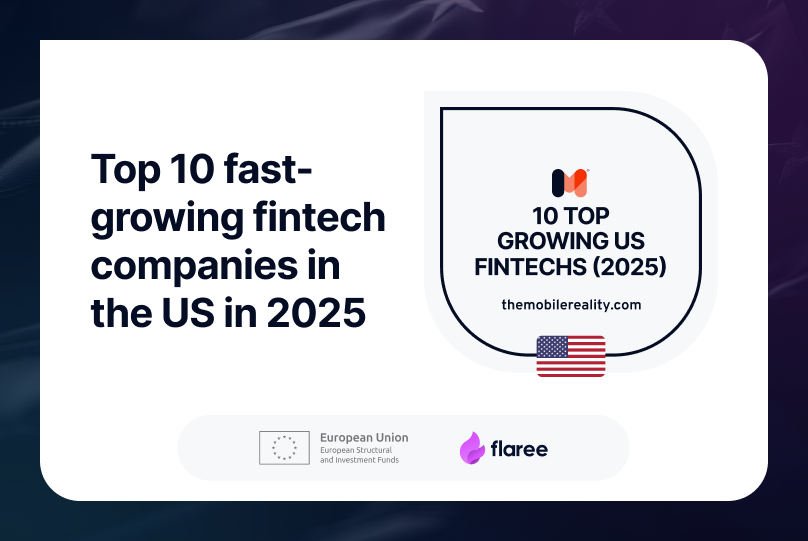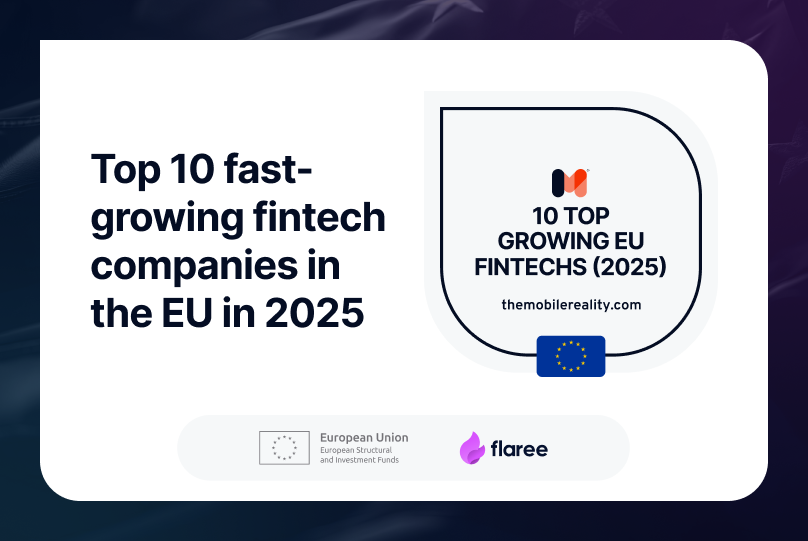Introduction
In today's fast-paced digital age, the quest to develop a standout digital product, be it a mobile application garnering thousands of downloads or a web application boasting thousands of active subscribers, is akin to navigating a labyrinth. The challenge lies not solely in acquiring users but in crafting a product that resonates, captivates, and retains. Every groundbreaking product commences with a spark—an idea.
This intricate journey underscores the significance of product design workshops. Often referred to by various monkers as product discovery workshops or product development workshops, they all converge on the same pivotal aim: to refine and crystallize the product vision. Such workshops are not mere brainstorming sessions but collaborative endeavors that delve into the intricacies of business goals, user needs, and technical specifications.
At Mobile Reality, we have adapted to the evolving business landscape by offering remote product workshops. This approach facilitates a more flexible and convenient collaboration, transcending geographical constraints. We pride ourselves on being more than just technical consultants; we're your strategic allies. Our proprietary product workshops see our team of experts join forces with our clients. Together, we demystify the client's business landscape, bring clarity to technical requirements, and shed light on the product's overarching vision.
But our role isn’t just to elucidate. It’s to innovate. By coupling best practices and our expertise with our client's vision, we brainstorm, strategize, and blueprint the optimal solutions—those that are not only cost-effective and efficient but also pragmatic. Our collective goal? To pave the smoothest path to product launch, ensuring that the end result isn't merely a functional product but an immersive experience for end users.
Difference between product development workshops, product design workshops, and product discovery workshops
Yes, while the terms "product development workshop," "product design workshop," and "product discovery workshop" are sometimes used interchangeably, they generally refer to distinct stages or aspects of the product creation process. Here's a breakdown:
Product Discovery Workshops:
Purpose of the workshop: To identify and validate the problem to be solved, target audience, business goals, and market opportunity. This is a critical phase where the viability of an idea is tested.
Workshop Activities: Research, stakeholder interviews, user surveys, competitive analysis, and sometimes even fieldwork.
Outcome from the workshop: A clearer understanding of the problem, potential solutions, user personas, and possibly an initial product vision or concept.
Product Design Workshops:
Purpose of the workshop: To visualize and plan the look, feel, and user experience of the product.
Workshop Activities: Creation of wireframes, mockups, user journeys, and interactive prototypes. Brainstorming on UI/UX design and gathering feedback on the designs.
Outcome from the workshop: A tangible representation (prototype) of what the product might look like and how it might function, ready for user testing or further refinement.
Product Development Workshops:
Purpose of the workshop: To strategize and plan the actual building of the product.
Workshop Activities: These workshops delve into technical considerations, architectural planning, feature breakdown, technology stack decisions, and more. It's about turning the design into a functional product.
Outcome from the workshop: A detailed development plan, possibly a product backlog, a defined MVP (Minimum Viable Product), and a roadmap for subsequent sprints or phases.
To summarize, while there's overlap in the terms, each type of workshop typically has a different focus:
The discovery workshop is about understanding the problem and opportunity.
The design workshop is about visualizing the solution.
The development workshop is about building the solution.
In practice, the lines between these workshops can blur, especially in agile environments where discovery, design, and development can be iterative and intertwined. However, it's essential to recognize the differences to ensure each phase receives the attention it requires.
Unified Workshop Approach by Mobile Reality
The Mobile Reality team has pioneered an integrated approach that seamlessly blends the elements of product discovery workshop, design workshop, and development workshops into a singular, holistic "product workshop." Recognizing the interconnectedness of each phase and the iterative nature of modern product creation, our unique methodology ensures a fluid transition between the understanding, visualization, and building processes. By consolidating these workshops, we foster a collaborative environment where insights from one phase immediately inform the next, reducing redundancy and maximizing efficiency. This unified approach not only streamlines the product creation journey but also guarantees that every decision, from conceptualization to execution, is well-informed, consistent, and aligned with the overarching vision. At Mobile Reality, we believe in harmonizing the distinct facets of product creation to deliver unparalleled value to our clients and end-users.
Importance and benefits of development workshops for new product
Product workshops enable our designers and developers to align with the product vision and overarching business goals.
While clients are often domain experts with in-depth knowledge of their product's context, they might inadvertently omit details from the brief, taking for granted certain information they deem self-evident. Conversely, while our designers and developers might be venturing into unfamiliar territory, they bring to the table a wealth of expertise in crafting digital solutions. The convergence of domain acumen and technical know-how is essential, and this is precisely where product workshop come into play, fostering a harmonious synergy between teams and clients.
Moreover, the digital landscape is teeming with a myriad of products spanning diverse marketplaces, from real estate and NFTs to fintech and beyond. Carving out a compelling value proposition for software development within these niches can be daunting. This is where Mobile Reality's seasoned experience shines. We aren't just another tech solutions firm; we're the trusted tech partners for leading global entities. Our forte lies in transmuting raw ideas, fused with our tech insights, into lucrative digital products. Our prowess extends to bolstering real estate ventures with data-driven digital solutions and building scalable fintech platforms underpinned by cutting-edge technologies and bespoke R&D endeavors aligning with your unique business objectives.
Product workshops put your project assumptions into question
Typically, our product team is presented with a brief, a rundown of functionalities, and on occasion, comprehensive product documentation. However, it's during the design development workshops that these foundational elements are truly put to the test. Here, we critically assess the existing project assumptions against well-defined user needs. Not only does this exercise ensure alignment, but it also paves the way for innovative solutions to challenges identified by the client.
Workshops are more than mere validation checkpoints; they're collaborative platforms. By juxtaposing business requirements with technological feasibility, we can architect both immediate and long-term solutions that are both effective and economically efficient. Through these workshops, step by step, we bridge the gap between vision and viability, ensuring the end product truly resonates with its intended audience.
Product workshops help brainstorm new ideas
At the heart of our digital product development process is a synergistic collaboration between our product team, product manager, business analyst, and workshop facilitator. Leveraging a medley of creative and design thinking methodologies, we catalyze the ideation process, fostering an environment ripe for innovation. In tandem with our clients, Mobile Reality partakes in intensive brainstorming sessions, sifting through a plethora of ideas to pinpoint the most fitting solutions for the given product.
Central to this collaborative endeavor is cultivating an ambiance of open dialogue and constructive critique. The most impactful design workshops are those that empower every participant to voice their insights fearlessly and to provide candid feedback. Such an atmosphere not only fuels creativity but also ensures the collective intelligence of the group is harnessed to its fullest potential.
Process that discovers the project’s risks and weak points in product vision and business goals
Product design workshops, fortified by design thinking principles, act as a magnifying lens, illuminating potential pitfalls in a project. From uncharted uncertainties to overlooked functionalities, potential implementation hurdles, and inherent risks—these sessions uncover them all. The team is better equipped to strategize and mitigate potential roadblocks by laying out these challenges upfront, ensuring the product's eventual success.
Leveraging our extensive experience, we frequently enrich the product backlog and augment the client's vision. More often than not, we introduce essential functionalities that, while fundamental to system creation, might slip the client's mind or lie beyond their realm of knowledge. Specifically, we emphasize:
Seamless integration with external services and tools, eliminating the need to build redundant functionalities from the ground up.
Anticipating and addressing various edge cases is an integral part of product creation, ensuring robustness and comprehensiveness when crafting a system from its nascent stages.
By proactively identifying and addressing these nuances, we enhance the resilience and efficacy of the final product, ensuring it stands the test of time and the vagaries of the market.
Getting better cost estimations for your project
Product design workshops play a pivotal role in sharpening the financial acumen of the development process. By meticulously dissecting the project alongside developers and engaging in substantive discussions with our clients, we attain a granular understanding of both the project's breadth and depth. This not only illuminates the intricacies of the work at hand but also enables a more precise and informed estimation of costs for subsequent project phases. In essence, these sessions ensure that budgetary decisions are rooted in clarity and foresight, steering projects toward optimal financial efficiency.
They help you to know our Mobile Reality better
Design workshops serve as more than just a platform for ideation and strategy; they're also a window into the heart and soul of Mobile Reality. These sessions present clients with the invaluable opportunity to familiarize themselves with the dedicated project team set to breathe life into their product vision.
Engaging in detailed discussions and activities, clients traverse the nuances of their products in collaboration with our product development team including project managers, UX designers, and both frontend and backend developers. This experience sheds light on the inner workings of our #MRTteam, offering a firsthand glimpse into our approach, dedication, and passion for each project.
Are you ready to discuss and work on your digital product idea?
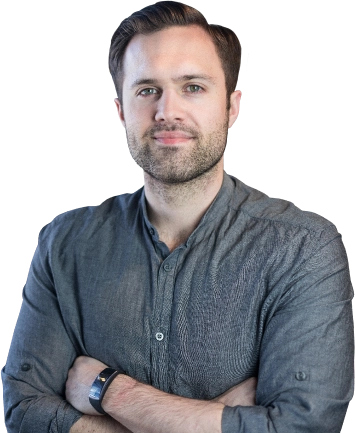
Participants in the product workshops
The workshop participants can vary based on the nature of the product, the stage of its development, and the workshop's goals. However, for a comprehensive product workshop that encompasses discovery, design, and development, the following participants are commonly involved:
Product Manager/Owner: This individual typically clearly understands the product's vision, goals, and business objectives. They serve as the bridge between business needs and technical execution.
Technical Architect/Leader: This person can provide a high-level view of how different technical components will fit together, ensuring the product is scalable, maintainable, and in line with current tech standards.
UX/UI Designers: These professionals focus on the user experience and interface design. They'll be instrumental in creating mockups, wireframes, and interactive prototypes.
Key Stakeholders/Clients: These are the individuals or representatives from the client's side with a vested interest in the product. Their feedback is crucial for ensuring that the product aligns with their expectations and needs.
Business Analyst (optional): Responsible for breaking down business requirements into actionable tasks and ensuring that the product aligns with business needs and objectives. This role is optional. In Mobile Reality our Product Managers are able to fully cover this role.
Frontend and Backend Developers (optional): They provide insights into the technical feasibility of proposed features, potential challenges, and the intricacies of implementation. Their input can greatly influence design decisions. Developers' commitment at this level is optional. In Mobile Reality, the presence of a technical leader is enough to consult on all tech aspects of the product.
QA Specialist (optional): A quality assurance specialist can provide insights into potential pitfalls and ensure that the product meets quality standards.
Users or User Representatives (optional): Including actual or potential users can provide invaluable insights into real-world use cases and needs. They can offer a perspective that's closer to the end-user experience.
Remember, the exact mix of participants can vary. The key is to have a diverse group that can provide a holistic view of the product from business, technical, design, and user perspectives.
Duration and product development workshop deliverables
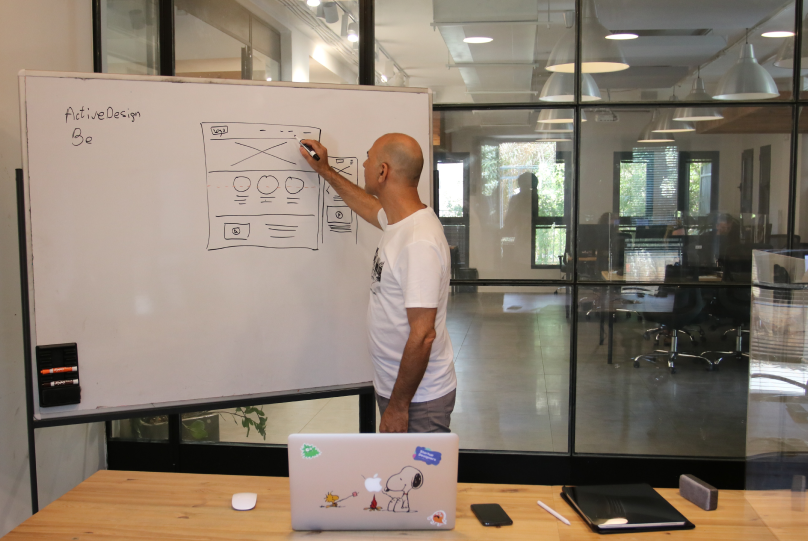
1. First online discovery workshop session
The first workshop session is a collaborative endeavor that delves into the heart of product creation. Here, our client's vision melds with the expertise of Mobile Reality’s multifaceted team, comprising product managers, business analysts, frontend and backend developers, UX/UI designers, and QA specialists.
This interactive session delves into the detailed materials provided by the client. Together, we dissect and analyze the intricacies of platform functionality and operations as proposed by the client. Concurrently, the Mobile Reality team puts forth its tailored questions and recommendations. Key elements to be delineated during this session include:
The target audience,
Core product values intended for the end user,
Overarching business objectives,
User roles and persona definitions,
The user's journey through the product,
A deep dive into one or two primary processes.
While the session typically spans approximately two hours, its duration is inherently flexible, molded by factors such as product intricacy, the breadth of analysis the client wishes to undertake, and the multitude of features up for discussion.
Post this collaborative session, the onus shifts to the Mobile Reality product team, as they embark on a meticulous internal analysis. Their mission? To chart out a preliminary, detailed scope of work, outlining the initial stages and phases of the project. This refined blueprint is then shared with the client, setting the stage for a constructive dialogue during the subsequent workshop session.
2. Second online product design workshop session
The second workshop session is geared towards refining and iterating based on feedback. It centers on a thorough discussion of the client's observations and remarks concerning the initial scope of work as presented by Mobile Reality.
This collaborative engagement ensures that any modifications to the preliminary scope are mutually agreed upon. The outcome? A consolidated and final scope of work that serves as a guiding blueprint for the ensuing phase of collaboration.
Further aligning with the client's aspirations, this session might also broach the topic of crafting a UX/UI design prototype. This entails deliberating on the core visual components, such as foundational views, color palettes, and essential design elements.
But the dialogue doesn't end at design alone. A pivotal part of this session delves into the technical landscape of the project. Here, we confront and navigate through potential challenges and constraints, including:
The distinction and challenges between mobile websites and standalone mobile apps,
The spectrum of supported browsers,
The range of compatible mobile devices,
Supported operating systems,
Preferred cloud service providers,
And other nuanced technical facets inherent to each mobile or web-based project.
By the conclusion of this session, there's a clear roadmap not just for the design and technical components, but also a strategic blueprint for subsequent steps post-workshop, ensuring all stakeholders are aligned and equipped for the journey ahead.
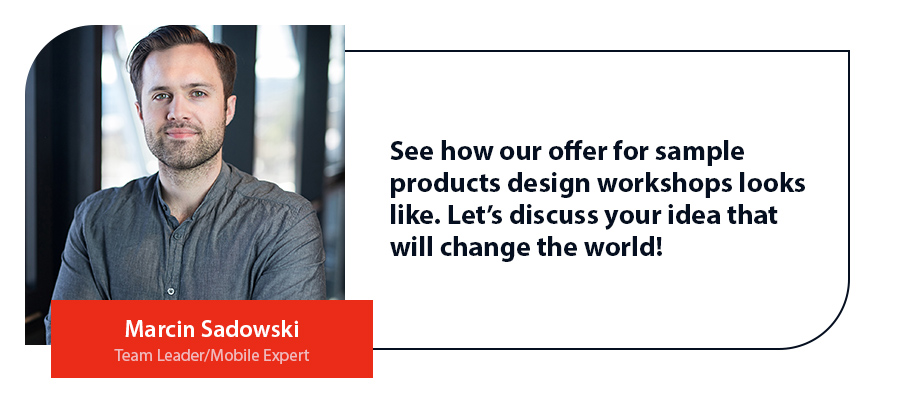
3. Product workshop deliverables
Emerging from the product workshops, participants can anticipate a suite of well-defined deliverables that streamline the product's journey to market:
User journey: detailed description of one or two main user workflows in the app
Technical specification: list of technologies, frameworks, browsers, described tech development approach
Product backlog: A meticulously crafted design specification and product backlog ensure phased and systematic market deployment.
Interactive wireframes or designs: Interactive mockups, replete with cutting-edge UX designs and UI layouts, are brought to life using industry-leading tools such as Adobe XD, Figma, or other notable UX design utilities. These mockups, which clients can readily review and validate, are optional but offer an invaluable glimpse into the envisioned product.
It's worth noting that while we've delineated a typical workshop structure, flexibility remains at its core. The number of sessions can be tailored based on the project's intricacy, and should the client express the need for more in-depth discussions about specific aspects, features, or modules of the web or mobile product, we're more than equipped to accommodate.
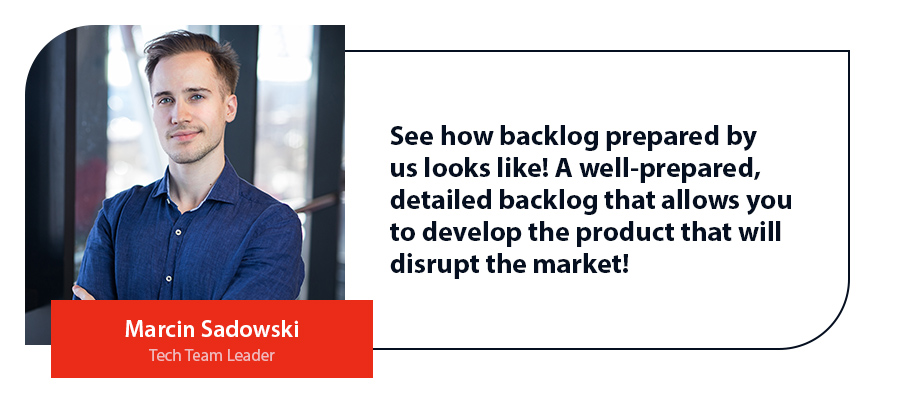
Conclusion
The process of product development is intricate, layered, and dynamic. From the nascent stages of understanding the target audience in the product discovery phase to the continued evolution post-launch, every step is vital in crafting a product that not only meets but surpasses user expectations. Engaging in design workshops facilitates collaboration, ensures a shared vision, and paves the way for innovation. Leveraging tools like personas, wireframes, and prototypes assists teams in visualizing the product journey and preemptively addressing potential challenges. Mobile Reality's approach, as showcased throughout the sections, emphasizes thoroughness, stakeholder collaboration, and a commitment to delivering optimal digital solutions. It's this synergy of strategy, design, and feedback that forms the backbone of a truly successful product development endeavor.
Exploring the Business Facets of Software Development
The business product strategy behind software development is as crucial as the technology itself. At Mobile Reality, we provide a deep dive into the various business models, methodologies, and strategies that drive profitable and efficient software creation. Our comprehensive articles are designed to guide you through the complexities of the custom software development business:
These resources are crafted for those looking to refine their approach to building and managing software projects. Whether you’re contemplating the most effective development methodology, weighing the pros and cons of outsourcing, or deciding on the right pricing model, our insights can lead to informed decisions. Contact our team for a personalized consultation on software development business strategies. We’re here to help you navigate the path to success in the digital product landscape.



